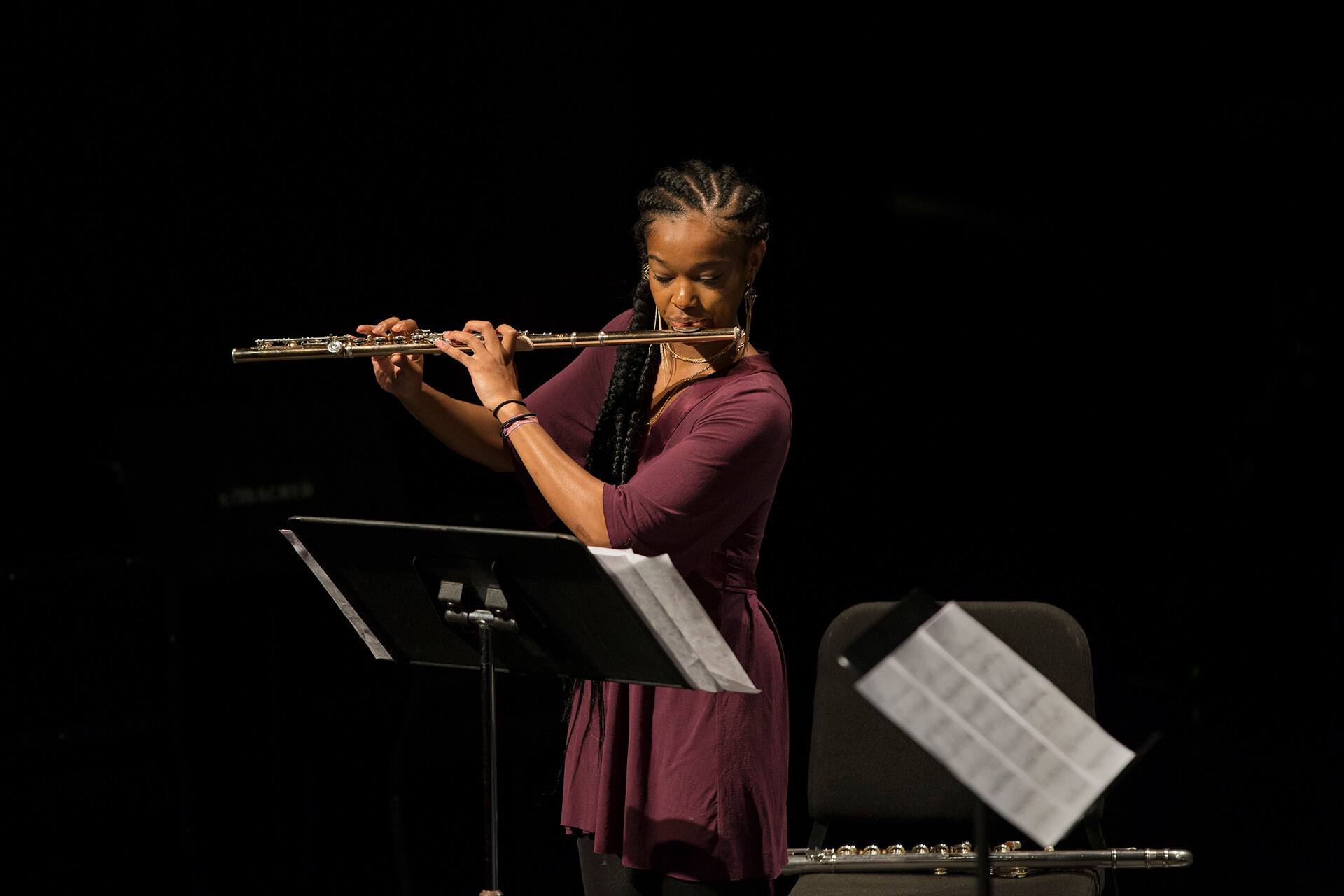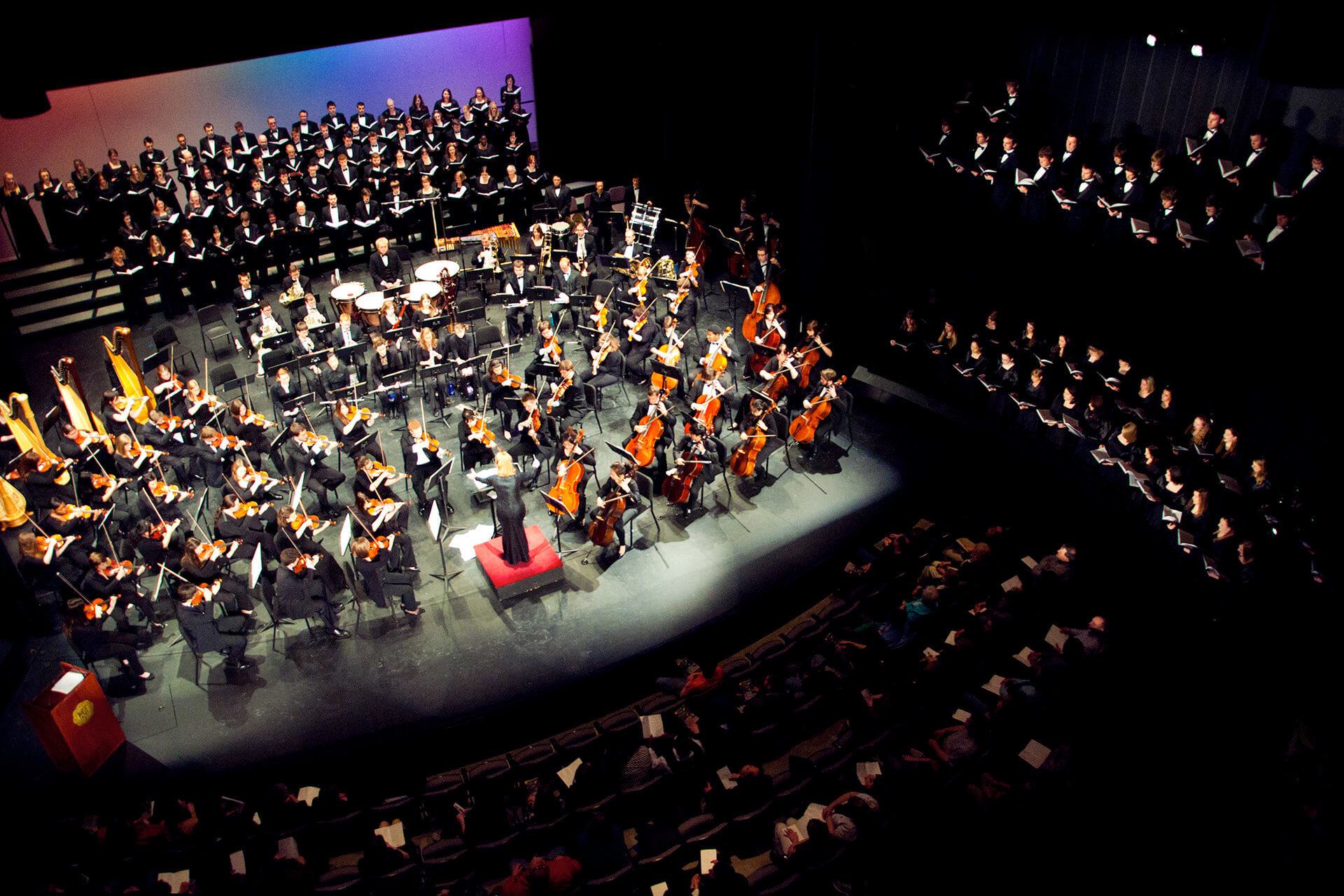Nationally recognized for student experience
The Wall Street Journal

Bachelor of Music (B.M.)
Music Performance
Up-and-coming musicians looking for the best music performance colleges in the U.S. choose Bowling Green State University because it delivers on promises to prepare students for diverse musical professions and life-long career growth.
The music performance degree program in the BGSU College of Musical Arts offers a wealth of conservatory experience balanced with a strong culture of creativity, personal engagement and encouragement.
Learn from some of the most esteemed educators in today’s music world. Gain ample performance experience and high-level proficiency in your chosen instrument (voice, strings, woodwinds, brass, percussion, jazz guitar or keyboard).
You will go beyond mastery of technical skill. Our graduates acquire in-depth insights into music theory and make priceless professional connections before breaking into illustrious careers in opera, orchestra, theater, film, broadcast, education, production and more.
Why study music performance at BGSU in Ohio?
- Learn from the very best. Get the finest instrumental/vocal training in a comprehensive, undergraduate curriculum. Each music faculty member is renowned in their own right and all share a passion for elevating young performers to their greatest potential. Reach new heights connecting with frequent visiting masterclasses and endowed guest artist series.
- Hansen Music Fellowship. This award is given to two incoming music performance freshmen each year. It offers annual funding for professional development opportunities throughout the degree program.
- Modern facilities. The Moore Musical Arts Center facilities have more than 70 practice rooms, an 822-seat concert hall, a 221-seat recital hall and state-of-the-art computer labs and recording studios.
- Small class sizes. Faculty-to-student ratio in the BGSU music performance undergraduate program is 6:1.
- Customize your career path. Specialize in jazz, piano, vocal pedagogy, voice or woodwind.
- Seize the spotlight. Student musicians have 350+ performance opportunities every year, including 30+ large and small ensembles, ongoing special events and festivals. Awards for travel grants and cash prizes are available for competitions in concerto, chamber music, art song and more. Perform in the New Music Ensemble or in ongoing off-campus community recitals.
- NASM accreditation. The BGSU Music Performance degree program adheres to the stringent standards of the National Association of Schools of Music.
- Make an impact. Join student service organizations such as Pro Musica or become a music ambassador to help with a college festival or competition. Attend conferences to network with music colleagues from around the country.
Music performance admissions
You must audition to major (or minor) in music performance at BGSU. First apply to the University and then schedule an audition. Acceptance – and continuance – in the music performance degree program is dependent on jury approval each semester.
#1 public university in Ohio for career prep
The Wall Street Journal
Career - what can you do with a music performance degree?
Many people dream of a career in music. A BGSU music performance degree makes it a reality.
Our music performance graduates are sought-after singers, musicians, producers, directors, executives and educators. They land highly-competitive spots with prominent orchestra, opera and performing arts companies.
Others find their professional footing in film, theater, television, radio, streaming services, religious organizations or schools.
Music performance degree alumni have landed prestigious spots in ensembles such as:
- Cleveland Orchestra
- Metropolitan Opera
- Chicago Lyric Opera
- National Symphony Orchestra
- Count Basie Orchestra
- Detroit Symphony Orchestra
- The “President’s Own” Marine Band
Some have been accepted into highly-competitive graduate programs, such as the Eastman School of Music, Cleveland Institute of Music and the University of Michigan.
Career paths
- Opera singer
- Orchestral musician
- Instrumentalist
- Recording artist
- Freelance studio performer
- Applied professor
- Conductor or director
Quick Facts from the Bureau of Labor Statistics
Curriculum
All music performance degree majors must audition and participate in at least one major ensemble each semester. They must also complete one full recital, usually senior year, following jury approval.
Applied piano instruction is also required for all music performance majors, who must perform at least one composition from memory to graduate. They must also maintain a 3.0 GPA.
Additional requirements will depend on the student’s core study focus:
Staging a successful career in music performance starts with raw talent. Reaching one’s full potential, though, means practicing, refining and elevating that talent. To unlock prime opportunities, musicians in every specialization need impressive performance resumes, extensive professional networks and a solid grasp of how to navigate the music industry.
Graduates with a BGSU music performance bachelor’s degree must demonstrate:
- Excellence in musical expression in performance in solo and ensemble recitals
- The ability to critically analyze musical works, make informed judgments about music compositions and performances, and understand the styles and structures of music as related to performance
- Knowledge about the traditions, history and styles of music, art and other disciplines
- Introspective listening skills and acceptance of constructive critique
- Application of technical vocabulary – to communicate with other music professionals and teach novices

Sample courses
- Small and Large Ensembles
- Pedagogy and Repertoire
- Conducting
- Jazz and World Music
- Private lessons with distinguished faculty
MidAmerican Center for Contemporary Music
The MidAmerican Center for Contemporary Music serves as the hub for BGSU’s distinctive specialty in contemporary music. It regularly showcases outstanding student works and performances. The music world looks forward each year to the Bowling Green New Music Festival (since 1980) and the Music at the Forefront Concert series.
- Administers generous grants supporting new contemporary student music projects and research
- Ongoing organization of the New Music From Bowling Green concert series, featuring both faculty and student performances at prestigious venues across the country
- Produces a radio broadcast with WGTE-FM in Toledo
- Keeps an archive of 10k+ scores – invaluable musical scholarship resources in contemporary music
#1 university in Ohio – big or small, public or private – students would choose again
The Wall Street Journal
The music performance program is part of the BGSU College of Musical Arts.
Accreditation
The Bowling Green College of Musical Arts is accredited by the National Association of Schools of Music (NASM) and is in good standing.
Bowling Green State University [BGSU] is accredited by the Higher Learning Commission. BGSU has been accredited by the Higher Learning Commission since 01/01/1916. The most recent reaffirmation of accreditation was received in 2022-2023, with our next reaffirmation of accreditation scheduled for 2032-2033. Questions should be directed to the Office of Institutional Effectiveness.
Request Information
Updated: 08/05/2025 03:19PM

